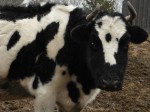At the Resistance Ecology conference last weekend, during the Q&A following my lecture on “Queering Animal Liberation,” an audience member noted that our brochure identifies VINE as LGBTQ-run and wondered why we specify that. In short, it’s because we’re proud to have met the extra material and emotional challenges that being LGBTQ introduces to the . . . → Read More: Thirteen Years of “Queering Animal Liberation”
|
||||

On a hot June night in 1969, LGBTQ folk said “no” to state repression, fighting back against a police raid of the Stonewall Inn. The ensuing uprising, led by drag queens and street kids, ushered in a new, more radical, era of activism against homophobia. While earlier efforts, such as those organized by the Mattachine . . . → Read More: Pride Month Pledge Drive 
Locavores and ex-vegetarians alike seem to share some common misconceptions about locally-sourced animal products. For example, they seem to believe that the environmental waste associated with meat, dairy, and egg production will be lower on a small-scale farm than on a factory farm or CAFO (confined animal feeding operation). While CAFOs do pollute their local . . . → Read More: The Many Faces of Happy Meat In light of allegations made in response to our open letter to parents, we think that students and parents should see this past letter to the college President, which was emailed on 12 October and sent by post to the college a couple of days later. The President never replied and (so far as we . . . → Read More: Letter to the President of Green Mountain College I’ve written before about my skepticism concerning love as a motivator for animal rights work (or, for that matter, liberation work of any kind). Whenever I hear “I just love animals” in the course of a conversation about someone’s rescued dog, I immediately crouch down inside my brain and wait for them to mention the . . . → Read More: Compassion, Empathy, and Rage: Some Thoughts from the Kaporos Protests 
It’s “Demystify Dairy Day” here at VINE, where the true-blue September skies make it impossible not to see something the dairy industry doesn’t want people to know: Dairy cows are very, very sad. . . . → Read More: Demystify Dairy Day It’s no secret that the Chesapeake Bay is in serious trouble. One might say the bay is dying, and certainly parts of it are actually dead. Yet past efforts to “clean up the bay” have been hampered by the refusal of activist groups to place the blame where it belongs; namely, in large part in . . . → Read More: Finally, Some Truth Comes Out about the Chesapeake Bay Humans are good at living in our symbolic realities, even when they directly contradict the real world. This is extremely well symbolized by the fact that we idealize the concept of motherhood, even while we treat our own mothers like shit. I’m not talking about abusive mothers; I’m not talking about mothers who never mothered. . . . → Read More: Support the Cow Ribbon Campaign This Mother’s Day: Stop Using Cow’s Milk! Science fiction is a vastly underrated genre. For almost 200 years now (if you consider Mary Shelley’s Frankenstein to have been the first modern science fiction novel), it’s been on the cutting edge of the technological changes that drive society — not just making up stories about such innovations, but extrapolating them to their logical . . . → Read More: The Matrix and the War on Christmas |
||||
|
© 2024 VINE Sanctuary (formerly Eastern Shore Sanctuary) Powered by WordPress & Atahualpa |
||||




Intersectionality and Animals
Here’s the video of my recent lecture, “Intersectionality in Theory and Practice” at the International Animal Rights Conference in Luxembourg last month. For those who don’t have the time or patience to watch a 90 minute lecture, I’ve recapped many of the key points below. You might also want to visit the “Intersections” section of . . . → Read More: Intersectionality and Animals